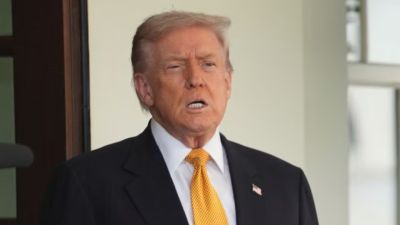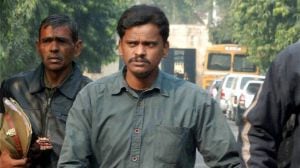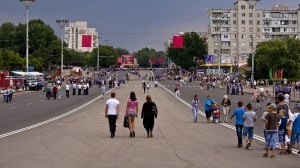PM cant just say I am a good man but every other man is making money
Arun Jaitley,senior BJP leader and leader of Opposition in the Rajya Sabha,was at the Express for an Idea Exchange. In this session moderated by Contributing Editor of The Indian Express,Coomi Kapoor,Jaitley explains why the BJP has been holding on to its JPC demand.
Coomi Kapoor: In the first year of UPA-II,we saw new Opposition leaders inParliament function as a constructive Opposition. Now,Kapil Sibal accusesyou of being obstructionist and opposing everything the government does.Why have both sides hardened so much?
Arun Jaitley: It is true that we have had interactions with the government and we havetried to resolve certain issues. The Nuclear Liability Bill could not havebeen passed,given the current composition of the Indian Parliament,butfor this approach. Most legislation was carried through. If there was aproblem,we either tried to sort it out or the matter was referred to acommittee. So why did this obstructionism come up? Earlier when issues cameup,the stalemate was over the voting on resolutions,provisions. And itused to be resolved,there was a compromise resolution because thegovernment had a narrow majority in the Lok Sabha and in Rajya Sabha theyare in a minority. Also,on issues like price rise,climate change,therewas a fair amount of floor coordination amongst the Opposition,mostlyduring the parliamentary debates.If you look at the 2G scam,it was at the end of 2007 that most of thesethings were happening. The allocation took place in 2008 and by the timefacts surfaced,we were moving towards an election. This was an issueduring the elections but it was confined to press conferences,pressstatements. Post elections,a new government was formed,this was taken upin a big way,particularly in the Upper House. The big debate on this tookplace on July 23,2009. If you look at the facts we gave,except for the 3Grates which had not come at that time,they almost overlap with the CAGreport.We debated it for three days. And yet we found that neither the media northe public was willing to accept the magnitude and enormity of the fraud.The PM was repeatedly asked about 2G,the spectrum,and Raja. I always felthe gave a very noncommittal reply in Parliament or outside. (He’d say) whathas Raja done,Raja tells me he has done exactly what Arun Shourie did,etc. But factually,this was not correct and you required a lot moreaction.In my assessment of this government,(if it was not) for the parliamentarystalemate,Raja would not have resigned,CBI would not have been activated.This competitive scam-busting the media is doing is also a part of it. Forsix years,this government had thought that it could do these things andget away with it. Parliamentary discussion is a great asset,but it alsohas its serious consequences. You discuss,you talk,you get wonderful newsin the newspapers the next day,and the magnitude of an issue like this oneis lost. Had we fallen into that trap,this is exactly what would havehappened. We did not fall into it,we stuck to our JPC demand. The resultis that all these actions have taken place,and what was going unnoticedfor at least two years has suddenly become a centre-stage issue.
Swaraj Thapa: The PM has said that he is willing to appear before a PAC. Shouldnt the Opposition walk a few steps forward so that this stalemate inParliament ends?
Arun Jaitley: Ill use this opportunity to give my assessment of the Prime Minister onissues of this kind. He has great strength in the collection of the usualtemplates and clichés. And hell use exactly the opposite when thesituation demands. So in 1996,when Narasimha Rao lost the post of theCongress party president to Sitaram Kesri,when asked him about his stand,he said Caesar’s wife must be above suspicion. Thats when he first usedthis phrase. In 2004,when he became PM,he inducted seven taintedministers. When asked how in view of his Caesar’s wife remark,he couldinduct chargesheeted people into the Cabinet,he said,the principle now isthat you are presumed innocent till proven guilty. He forgot these are two diametrically opposite facts. So he pulls out one cliché from one pocketand another from the other,depending on the situation. He has just triedto brush aside the 2G issue. And now when he is getting increasinglycornered,he goes back to his old strategy saying he will put himself andhis credibility on line by his willingness to be examined by PAC. Lets bevery clear what the issue is. Every time governmental transactions takeplace,CAG goes into those transactions. The CAG is like an internalauditor,it produces an audit report. The PACs jurisdiction stems from CAGonly. It is restricted. The magnitude of this issue is far greater.Politics,government formation,policy formation,portfolio allocation,distribution,people learning of your policy days in advance–these are notauditing matters,they are not accounting entries which PAC can go into.
Swaraj Thapa: You are stuck on one point,the government is stuck onanother. So there’s no movement forward.
Arun Jaitley: Politics is never stagnant. There will always be movement. But the fact isthat the CBI can only determine the criminality of the issue; as to retiredjudges giving reports on policy,the less said the better. Then you have aPAC with a limited jurisdiction. The only body which can look into allinstitutional ailments,as I call it,is the JPC. You say earlier JPCs didnot function: out of the three key ones,two related to institutionalchanges in the stock market. They made recommendations on which there hasbeen a follow-up. The criminality in those two–of Harshad Mehta and KetanParekh–is determined by the CBI. The only one which didn’t show resultswas the one which the Congress party rigged in 1988. It had a brutemajority then. The Opposition was not a party to the JPC,it was a Congressparty JPC. Its report said the Bofors kickbacks were winding up charges–itwas fabricated. This can’t be an argument against a JPC.
Shekhar Gupta: Why are they being so difficult with JPC?
Arun Jaitley: I don’t know. My lurking suspicion is that they have calculated that theyare comfortably placed with the numbers in a PAC and not in a JPC. And inthe JPC,I don’t know whether they trust their allies beyond a point. JPCwill have a government nominee heading it but they may not be fully incontrol because if the pro rata reflects the strength of the House,thenthe numbers may not favour them,particularly because of this Upper Housedifference in strength.
Unni Rajen Shankar: Isn’t it a question of our corruption versus theircorruption? When you look at your CM in Karnataka,Yeddyurappa,you seem tohave brushed it under the carpet.
Arun Jaitley:It’s not been brushed under the carpet. Yes,issues have been raised withregard to certain land transactions and land allotments. But let’s placethis in the context of corruption: there has been a history in the state ofchief ministers having the authority with regard to some discretionaryallotments and to the release of land which they don’t require. Now whetherthis was properly done or improperly done,questions can arise,and havearisen. There are various mechanisms going into those questions: you havethe Lokayukta going into those questions,a separate commission has beenappointed. Our party president has said he is taking somebody’s help ingoing through those questions. The issue is not closed. There are twothings which are raising concerns. First,after reforms in 1991,onegeneral feeling was that with delicensing and a lack of state control,corruption would decrease because the role of the state was less. Effectively,this has not happened. There are four areas across the countrywhich need to be looked into: one,real estate and land use and permission.The second is mining. You have a situation where the state gets very littlefor a public asset and what goes into private pockets is quite deep. Thethird is private sector education. The fourth is liquor and alcohol. And,if you geographically look at the extent of corruption,it is higher in thewealthier states.
Coomi Kapoor: But the question was regarding the double standards incorruption.
Arun Jaitley:Okay,you’re arguing that we are raising the issue of corruption whensomething is happening in our backyard. But there’s a process we have setinto motion and we have tried to determine what’s happened. That process isstill on.
Ravish Tiwari: The BJP is not questioning the integrity of the primeminister. You say the JPC will have a much wider ambit of inquiry than aPAC. If you are not questioning the integrity of the PM,are you trying topoint to someone else who tried to induct Raja?
Arun Jaitley:I think it’s the responsibility of any PM to make sure that the governmenthe runs is run on the basic principles of integrity. You can’t say I am agood man but every other man in the government is making money. Thequestion we are raising is that besides being honest,you must also beeffective in enforcing standards of honesty in your government.
Subhomoy Bhattacharya: Assuming that the government sticks to its currentstand on JPC,do you think Parliament can function smoothly without amid-term election?
Arun Jaitley:I don’t think there will be a need to go for a mid-term election on theJPC-versus-PAC issue. It’s a different question if they go in for mid-termelections because of the contradictions within the UPA. If you areuncomfortable with almost every other ally and vice versa and the numbersare not favourably inclined towards you,I am not sure what will happen. If the government thinks there’s an appropriate environment fora mid-termpoll,good luck to them.
Nistula Hebbar: When this government came to power in 2009,it appearedcomfortable,now it appears extremely shaky. What do you think has happened in the last one-and-a-half years?
Arun Jaitley:I’ll analyse it from both the sides,the government and the Opposition. Ithink in the government,there is a complete drift. The interpersonalrelations amongst people…one gets the feeling that all is not well. Theeffectiveness in enforcing a certain discipline on various ministries isnot there. I think there is an impression that the PM is transient now,that somebody else has to occupy this office,and that he is there as longas somebody else is not ready to take over. That has further reduced theeffectiveness. Also,there are multiple power centres. In a parliamentarydemocracy,in Cabinet formation,there has to be one key power centre,which is the PM. Lastly,there is the inability to discipline your allies.There’s an unease in Bengal,there’s a certain amount of unease in TamilNadu,the alliance in Maharashtra was never a great relationship.Look at P Chidambaram. When the first Dantewada killings took place,somesaid he should resign and some of us said that if we demand the homeminister’s resignation for a Naxal attack,we will strengthen the Naxals.We said that in Parliament and it looked like we were supportingChidambaram and the government was trying to pull him down. Theydemoralised him to such an extent that his whole hardline approach toMaoism is now gone–he now says its a state subject so why should hebother. This is how the government seems to be functioning.There is another great danger: if you over-emphasise your identificationwith a particular family,what the family does will never be wrong. Forexample,in WikiLeaks,the comment the young man (Rahul Gandhi) made (onHindu terror) slowly became part of the ideology of the party. It has notbeen disowned. Digvijay Singhs statements (on Hindu terror) appeared to bean aberration in the Congress. Today,Digvijay Singh represents themainstream. It becomes the government’s line. So the great line of wisdomnow is,lets deflect attention from corruption,lets take to it the RSSor some other issue. As against this,there is something interesting happening in theOpposition. There is a lot more coordination in Parliament. And the issueson which the Opposition clashes with each other are relatively fewer.There’s another important thing that I think is going to happen: after 33years,you may have a situation post April-May where the Left is without alarge government in a state. And the Left is a key organiser of the ThirdFront. So when a key organiser of the Third Front suffers in terms of itsown seats,its ability to organise the Front is going to be weakened.
Rakesh Sinha: Do you see more consolidation on your side?
Arun Jaitley:I dont know. Itll depend on a lot of ifs. The results in Kerala and WestBengal is one. How we conduct ourselves as the principal Opposition partyin getting others together,both in terms of issues and our own strategy,thats another. What happens in the Tamil Nadu assembly elections is thethird.
M K Venu: This kind of political churn has a rallying point. Who is thatrallying point now?
Arun Jaitley:We look at this differently. Post 1991,all new political parties whichhave come up in India are caste-centric and personality-centric. Some ofthe older parties have also moved in that direction. Only the Left and theBJP seem to be a little more structured. The whole emphasis in the last twodecades has been on families and succession through the family–whetherits the National Conference,Akali Dal,Samajwadi Party,etc. But one partof India is becoming truly aspirational,and there are indications thatthis idea of families,the successor,the glamour involved,may not work.In my analysis of Bihar after the elections,the one underlying feature wasthat both Nitish Kumar and Sushil Modi were average kind of people–sober,who offered clean governance. The Congress and the RJD could neverunderstand that. They had no local leadership to match Nitish Kumar orSushil Modi,so they used dynasty. It didn’t work. Bihar,in that sense,preferred merit to dynasty. I think another consequence of dynasty is that when you have too much concentration,your own leadership creation suffers.For instance in Gujarat,it is said theres no one to counter NarendraModi. The next state with this dynastic problem is Tamil Nadu. Across India,in state after state you will have the repercussions of this debateof merit versus dynasty.
Swaraj Thapa: Mukul Wasnik was hectored at the Congress plenary session forthe Bihar performance.
Arun Jaitley:They could not shout slogans against the young man so he was picked upon. Dynasties are only misled,they never make a mistake.
Rakesh Sinha: How much of a red flag is Narendra Modi for your electoralcampaigns?
Arun Jaitley:For the BJP,he has been a very effective campaigner. In inspiring our rankand file and his connectivity with them,he clearly stands out. There hasbeen a lot of campaigning against him,but despite that,post 2002,he hasrun one of the better governments. There is a problem since 2002 because ofthis whole campaign against him but slowly he is going through the entireinvestigation.
Swaraj Thapa: We talked about how Digvijays line has become the mainstreamCongress line on terror. Quite a few people affiliated with the RSS havebeen arrested for terror attacks. Does it bother you,and how much?
Arun Jaitley:I dont know what the actual substance of the charges is,I have notexamined that. But I dont think in India there is a systematic process bywhich some Hindu organisations will be involved in an extremist activity ofthis kind. Individuals in their extreme capacities can get misled into it.
Transcribed by Ravi Bajpai,For the longer version,log on to www.indianexpress.com



- 0121 hours ago
- 0211 hours ago
- 0321 hours ago
- 0421 hours ago
- 0511 hours ago




























